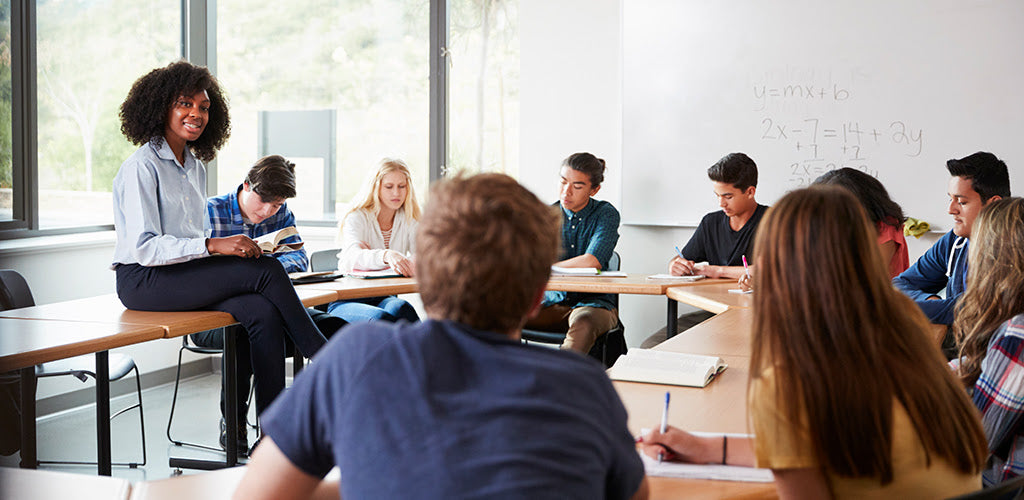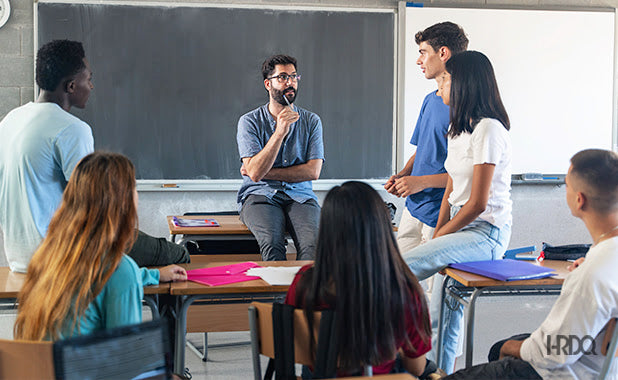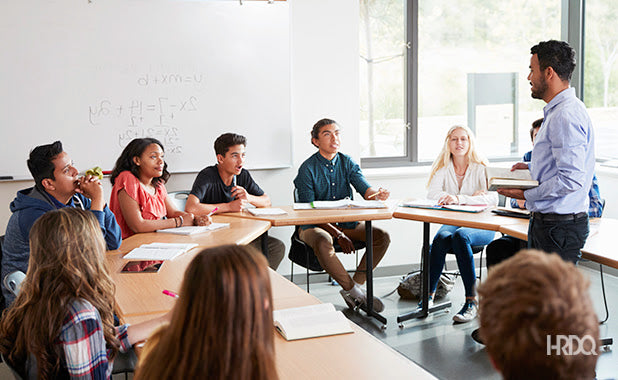Training tools for developing great people skills.

What Are the Core Ideas of Dewey's Education Theory?
John Dewey turned how we learn, promoting practical involvement in education. Forget the old days of just storing facts in your head. Dewey made learning in you – putting you at the center of your educational process.
Dewey championed hands-on problem-solving. He figured that soaking up information wasn't enough; learning should be linked to real life and sharpen one's smarts for different situations.
In Dewey's eyes, a classroom was a buzzing community where everyone was involved. It teaches people to see the teacher more as a coach than a lecturer, and learning this way packs your brain with know-how and nurtures your growth.
Are you considering using Dewey's ideas to spruce up learning at work or in groups? You're in the right place! Let's get started.

- Comprehensive training kit
- Customizable content
- Virtual, classroom, and e-Learning
Table of Contents
Why Is Experiential Learning Important?
Experiential learning is a bit like learning to ride a bike – you get the hang of it by doing, reading, or hearing about it. When employees jump into tasks and think about their actions afterward, they build a bridge from theory to practice, sharpening their skills to perform their jobs better.
Think of a time when a curveball was thrown your way at work. This hands-on technique arms you with the problem-solving skills to tackle these surprises confidently. Also, when people are very involved in what they're learning, they bring enthusiasm to their roles, boosting their productivity and helping them remember new information.
Interactive learning forges stronger teams. Just as players on a sports team learn to trust each other, employees develop a sense of community and teamwork. And honestly, no one likes to feel lonely at work, right?

Keep in mind that learning by doing is a never-ending loop. It involves testing, reflecting, and perfecting your methods. This cycle ensures that employees stay flexible and ready for anything, which is majorly valuable for companies that want to stay quick on their feet.
Creating a culture of active learning prepares everyone for the unforeseen, helping them to adjust and remain stable when things shift. Believe it or not, that's a big issue for any team.
The Part of Social Interaction in Education
John Dewey had a simple yet powerful idea about education – it should be hands-on and focus on people. Remember, he was onto something special. He saw learning as a social activity that flourishes through connection and reflection on personal experiences.
Think about this: when your lessons resonate with your life, they're more gripping, right?
Dewey centered his technique on the concept that we learn best through interaction. Teachers play an essential part here, nurturing a classroom tone where discussion and collaboration are common. It's somewhat similar to a sports team practicing – everyone contributes to the win.
Dewey championed "learning by doing." Imagine being in school, both sitting and listening, but actively involved in meaningful activities. Whether brainstorming with classmates or constructing tangible projects, this hands-on experience helps information stick – much like how you never forget how to ride a bike once you learn.

He proposed that schools should act as small communities, which makes you for life's broader stages. They're spaces where your unique abilities can shine, extending past digesting facts from textbooks to also include building social skills. Being a good team player or neighbor is as important as facing a math problem.
Dewey strongly believed in schools that cater to what sparks each student's interest. Picture a learning environment where your questions guide the process. Teachers would recognize each student's specific contributions, avoiding the feeling of being lost in the crowd.
Lastly, Dewey recognized the value of social harmony alongside academic achievement. Nowadays, it's insufficient only to be knowledgeable; you must also know how to engage harmoniously with others. If you think about it, that's an essential slice of what life means – participating in a community and collaborating. Schools have the prime opportunity to balance subject teaching with creating the skills to communicate, work together, and get along with one another. Believe it or not, that's a life lesson that's very much worth taking to heart.
Building Critical Thinkers Through Education
Critical thinking – what's that, you ask? It's the skill of not taking everything at face value – something that the insightful John Dewey advocated for.
Dewey was a trailblazer in education. He argued against the idea that learning means only cramming facts into our brains. He encouraged us to approach what we learn with a detective's curiosity, constantly asking questions and maintaining a healthy dose of skepticism until we know.
Dewey wasn't afraid to point out that schools should go beyond rote memorization. He believed we should also be taught how to think effectively. Again, it's a bit like learning to ride a bike. At the start, you're wobbly and falling over, but with perseverance, you're soon cruising effortlessly. Dewey envisaged critical thinking in much the same way – as a really important, habitual part of our minds.

Think about the daily decisions we face, like choosing a new smartphone or finding the best path to a mate's place. Dewey saw critical thinking as really important for these daily choices, just as it is for grand scientific breakthroughs and classroom learning. Surprisingly, he associated critical thinking with a scientific technique – experimenting with ideas, closely examining the evidence, and avoiding hasty conclusions.
To be clear, Dewey believed education is about absorbing information and becoming an expert at scrutinizing and questioning what you know. It's about winning at quiz games; it's about making you tackle real-life challenges and coming up with the best courses of action.
Remember, I'm talking about being knowledgeable and applying that knowledge wisely. After all, this is what enables us to make better decisions, and honestly, who doesn't want to be a pro at choosing wisely?
Integrating Students' Interests with the Curriculum
You'll find this interesting: education doesn't have to be a one-size-fits-all deal. John Dewey was onto something when he suggested changing learning to fit each student like a glove.
That means saying goodbye to everybody learning the same thing the same way and hello to a plan. That's what makes each student tick.
It's like when you're chatting with friends, and you bring up something they love – they light up, right? That's the trick; as a teacher, you can tap into what excites your students to make school more than homework. It could be the spark that sets them up for a love of learning that never burns out.
And remember, we're both talking about stuffing facts into brains here. Dewey realized we have to mix feelings with facts. When lessons stir up real emotions, everything sticks better, and kids start thinking on a whole new level.

Also, get this – Dewey was big on mixing it up. Instead of keeping subjects in their own corners, why not mix a bit of art with science or blend history and math? That keeps things fresh and puts learning in living colors, showing how everything's connected.
Long story short, if you're cooking up a class that echoes Dewey's ideas, you're both teaching and reaching out to students in a way that speaks to both their hearts and their heads. Set the stage right, and you're giving them more than good grades; you're opening doors to a world where learning never stops.
The Necessity of Holistic Education
John Dewey thought schools should be like mini-societies, where we learn to work together just like we do in the real world. Instead of just memorizing facts, he said we should really get our hands dirty with learning and see how things work in practice.
Believe it or not, Dewey linked good education with a strong democracy. He believed that intelligent, caring people make our society better – and that starts with how we're taught in school. He was a fan of the "learn by doing" motto, connecting school lessons closely to the real-life things we deal with every day.

For him, a good school lesson taps into different subjects to sort out the messy, complicated things we face outside the classroom. I'm talking about reading and math, but it's also about art and being creative to help us grow in all ways – both with our brains and our hearts and how we get along with others, too.
At the core of his idea, Dewey wanted us to become detectives in the classroom, to think deeply about things, and to solve difficult problems. He felt that education should adapt to what kids are curious about and what they need, which makes learning personal and fun. By putting it all together, he saw education as incredible for us and everyone else.
What Makes Dewey's Theory Relevant Today?
Think about being involved with new ideas as if you're having a casual coffee chat with a friend – no pressure, right? Well, that's how modern education is shaping up, inspired by a fellow named John Dewey. Imagine classrooms as collaboration hubs where students exchange knowledge. This technique is incredible for embracing challenges and personal growth.
So, what's the buzz in classrooms lately? Teachers are shaking things up with interactive lessons customized to spark every student's curiosity. Believe it or not, this has many uses beyond wanting to talk – it's legitimate for keeping students hooked and helping them excel.

Teaching is about memorizing things and encouraging a knack for questioning and innovating. Dewey would have been over the moon with this shift because it prepares students for a constantly growing world.
Look, the rigid teaching tactics of the past are on their way out. Education is both about taking exams and learning life skills – really useful things beyond the classroom walls.
Dewey saw education as a cornerstone of democracy, and guess what? That vision is alive and kicking. Schools want to support independent thinkers and active community members. I'm talking about cramming facts; it's about shaping mindful people who value their part in a democratic society. In short, Dewey's legacy lives on, guiding us toward creativity, personal growth, and a genuine appreciation for our communal fabric.
Improve Your Team Dynamics
John Dewey believed in the power of learning through experience. He suggested that the most effective way to learn something is to get involved and try it firsthand. His ideas really transformed educational approaches, focusing on hands-on experiences over solely theoretical learning.
He proposed that learning as part of a group is more fun and effective. This concept has influenced contemporary education, where collaborative projects are common, encouraging teamwork and peer-to-peer interaction.
Critical thinking skills were another aspect Dewey championed. He recognized their importance in creating thoughtful discussions and independent judgment. Today's education systems stress these skills to prepare students for unpredictable challenges.
Dewey also recognized that people learn differently and that educational approaches should cater to different interests to spark learners' enthusiasm. Modern classrooms commonly tailor learning experiences to students' passions, which makes education more involved and fun.
Also, Dewey advocated for a holistic technique to education, addressing students' emotional and physical health alongside academic growth. This comprehensive view of teaching was built to balance all aspects of a student's life, promoting overall health.

Dewey's teachings continue to shape educational environments, creating community and building critical thinking skills. But it's worth asking whether we're fully capitalizing on his insights today.
Taking inspiration from Dewey, our HRDQ course, Motivating Employees to Be Their Best, has insights from leaders into energizing their team members. It applies Dewey's educational principles to the workplace, aiming to create a collaborative environment. Check it out today!
So, after reading today's article, do you have any questions about Dewey's education theory, our Motivating Employees to Be Their Best course, or anything else we mentioned? If so, be sure to leave us a comment down below, and we'll get back to you as soon as possible! We make it a point to reply to every comment we receive, and we'd be more than happy to assist you however we possibly can. Feel free to reach out at any time!

About our author
Bradford R. Glaser











![[Guide] Mapping the Path of Erikson's Developmental Process](http://hrdqstore.com/cdn/shop/articles/Eriksons_Developmental_Process.jpg?v=1708737452&width=180)












![[Guide] What Is Vroom's Expectancy Theory of Motivation?](http://hrdqstore.com/cdn/shop/articles/A_Motivated_Employee.jpg?v=1702076987&width=180)




















![[Guide] What Are The Different Employee Onboarding Phases? - HRDQ](http://hrdqstore.com/cdn/shop/articles/guide-what-are-the-different-employee-onboarding-phases-549815.jpg?v=1688797514&width=180)








Leave a comment